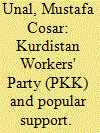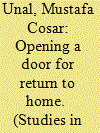|
|
|
Sort Order |
|
|
|
Items / Page
|
|
|
|
|
|
|
| Srl | Item |
| 1 |
ID:
113210


|
|
|
|
|
| Publication |
2012.
|
| Summary/Abstract |
The PKK has been a prolonged problem in Turkey, and various measures have been adopted to diminish and end the violence. In addition to the impacts on violence, these policies have also had an impact on public opinion and ethnic awareness of Kurds in Turkey. This article analyzes these policies and their effects on electoral support for the PKK by examining the vote shares of the pro-PKK political parties in national and local elections. It concludes that Turkey has conceptualized the issue solely as a problem of terrorism, but the goal, strategy, organization, and format of violence used by the PKK reflect the nature of an insurgency. Therefore, it is argued that Turkey, by ignoring the insurgency features, has disregarded the legitimate parts of the cause and related popular support, and thus has responded mostly with deterrent measures apart from the reforms of recent years. Results have shown that policies of deterrence culminated in a steady level of support for the PKK indicating that low level of legitimacy - as they were perceived by the people - of the policies resulted in viable popular and political support for the PKK. Despite the recent accommodative reforms, the existence of pro-PKK parties rallying electoral support in the political arena provided sustained level activities in the conventional politics in Turkey's municipal and national political system, in which they pursue pro-PKK agendas, such as 'Autonomy' and 'Confederation' as well as activities to increase the distinction in identity around the ethnic consciousness for more popular support. Yet, no clear pattern is identified between violence level and popular support in the macro-scale.
|
|
|
|
|
|
|
|
|
|
|
|
|
|
|
|
| 2 |
ID:
144868


|
|
|
|
|
| Summary/Abstract |
This study analyzes the impact of the Turkish Repentance Laws in undermining the Kurdistan Workers Party (PKK). Did the repentance laws increase the PKK surrender, thereby decreasing the PKK violence? Vector Auto-Regression analysis indicates that enactment of repentance laws did not have any significant impact on PKK surrenders, failing to significantly decrease PKK violence. Yet it does not establish any meaningful relationship between the use of force and PKK surrenders. Descriptive analyses show the significant number of surrenders took place in 1993–94, 2001, and 2003, while the highest number of penitents submitted to the “Return to Home Law” in 2003. These values relate to a specific context. This study, however, asserts that surrendered and applicant PKK members were too few to influence the overall conflict, concluding that, in addition to what these laws mean to the penitents, the success/failure of repentance policies are related to the nature of Turkey's counterinsurgency and their respective context.
|
|
|
|
|
|
|
|
|
|
|
|
|
|
|
|
| 3 |
ID:
132168


|
|
|
|
|
| Publication |
2014.
|
| Summary/Abstract |
The PKK, a violent group seeking secession in southeastern Turkey through the use of terror and guerilla methods, has evolved through different strategic and pragmatic phases in pursuing its goal. Ocalan, the incarcerated leader, classified the PKK's objectives into four deliberate strategic periods and commenced the final period of Strategic Lunge in March 2010 (for establishing de-facto autonomy). To compare these periods to PKK's real evolution, this article reviewed the entire process of the PKK (1973-2012) through analysis of resolutions from PKK congresses/conferences and the characteristics of PKK violence (e.g., target status, incident type/location, form, and purpose). This study argues that as opposed to Ocalan's assessment, PKK moves-particularly after 1994-are based on emergent (ex-post) pragmatic shifts rather than predetermined (ex-ante) strategic plans, as verified by analysis of the nature/form of PKK violence. It also argues that the PKK's pragmatic moves permeated even into its ideology and declared goal. Contrary to Ocalan's four-stage strategic periods, the PKK's initial manifesto indicates a three-stage Maoist strategy for reaching its goal. However, the PKK's military attempt to reach the third stage in 1991 failed due to conditions that were not sufficient for realization of the third stage of Maoist strategy. As a result, the PKK quit pursuing military victory after acknowledging its defeat in 1994; instead, since it still possessed the ability to initiate violence, it strategically employed (and ceased) violence to supplement its campaign of political compromise and negotiation.
|
|
|
|
|
|
|
|
|
|
|
|
|
|
|
|
|
|
|
|
|